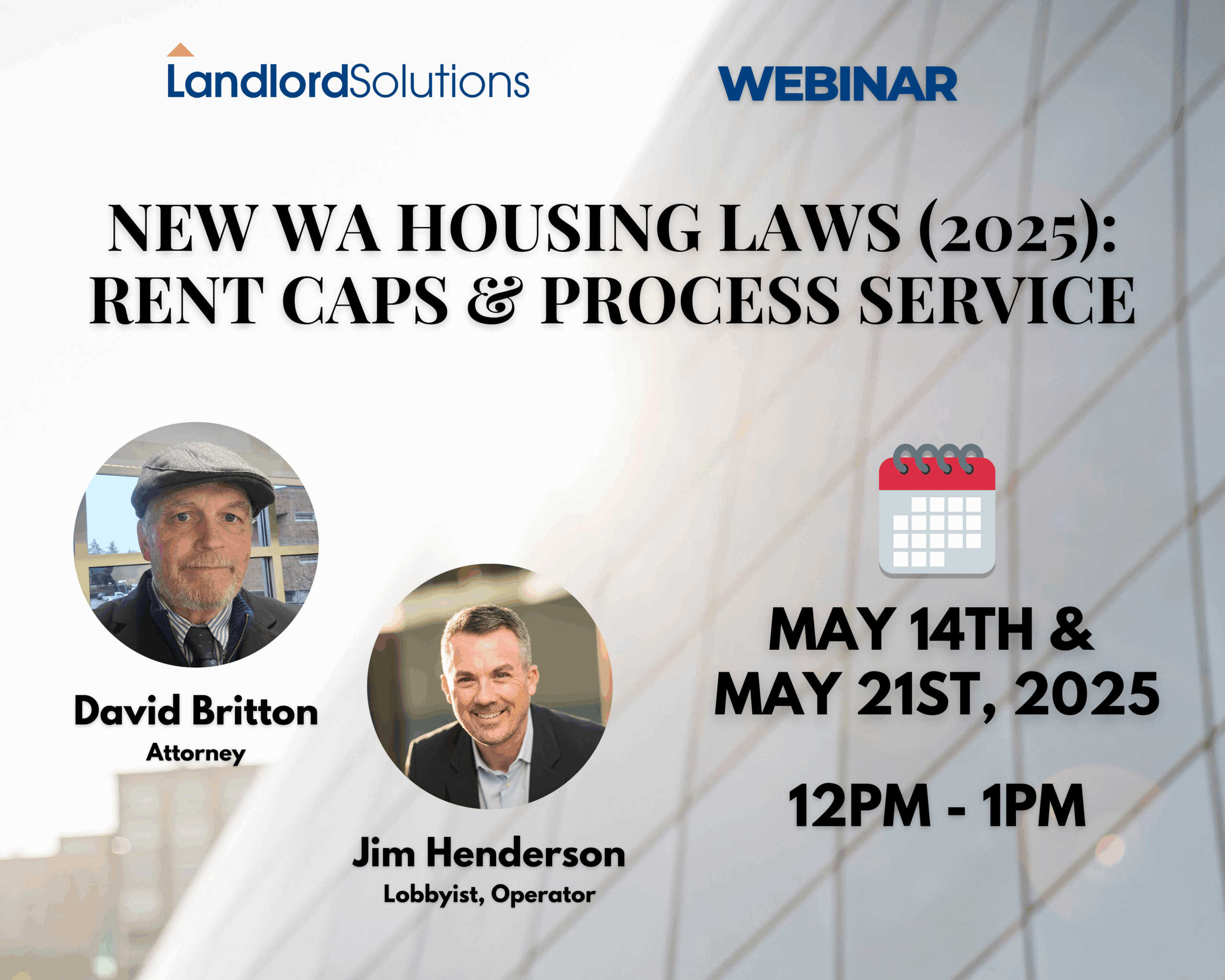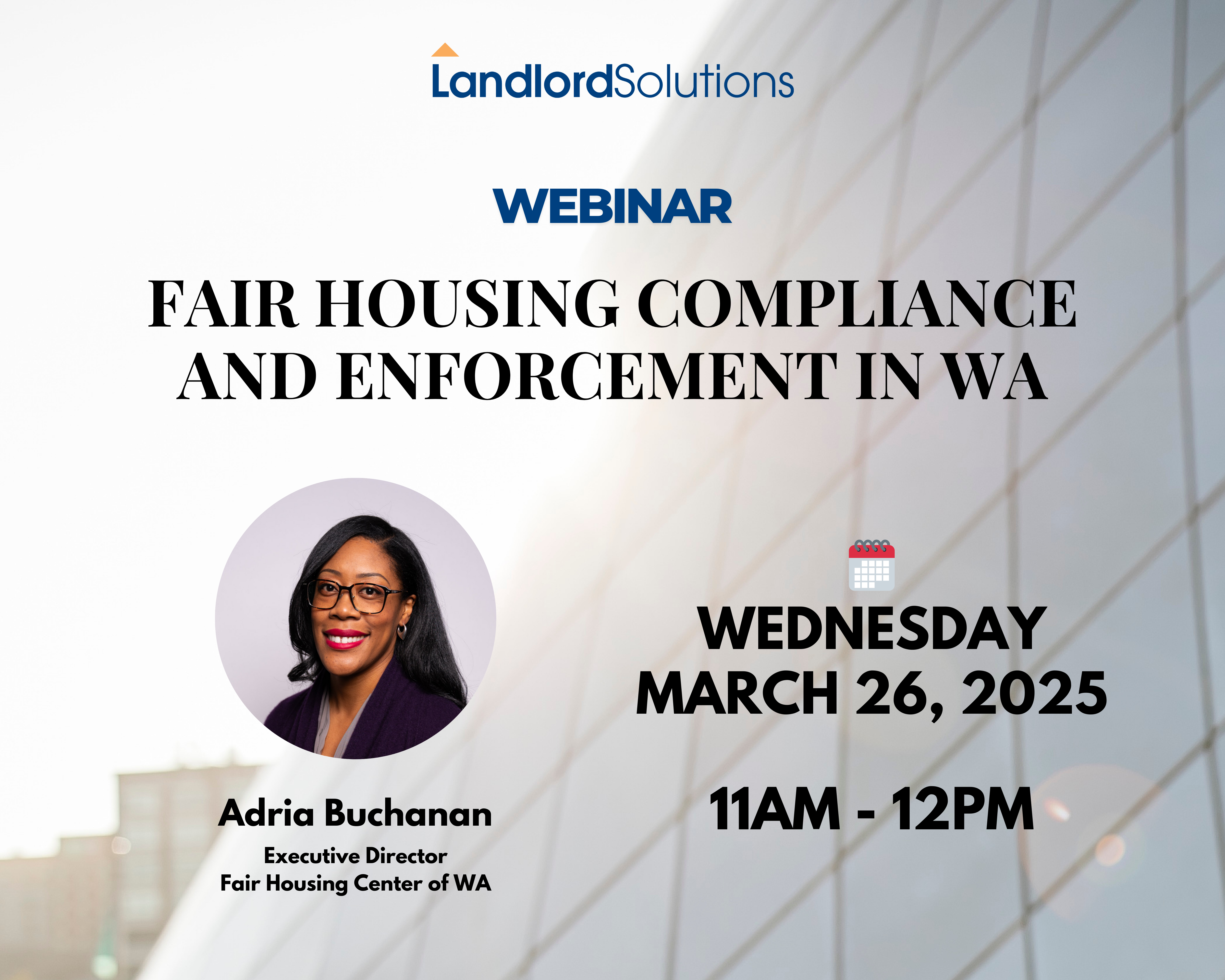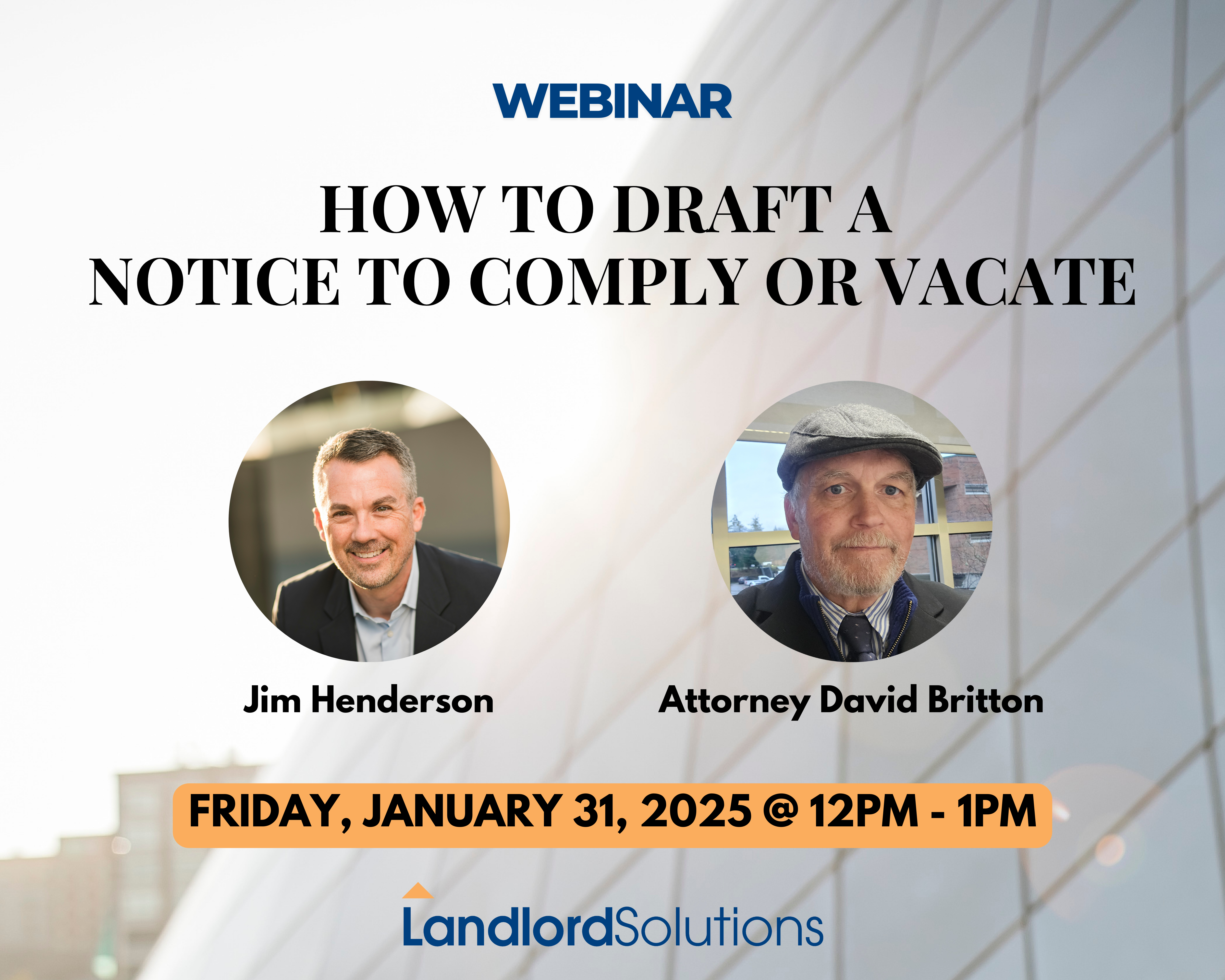Two-Part Webinar Series: New Rental Housing Laws 2025

Several new laws were passed during the 2025 legislative session in Washington state that affect rental housing operations. We invite rental housing operators and owners to join LandlordSolutions and attorney David Britton for a two-part webinar training series on updates to rental housing law in 2025. Housing providers who join our trainings will learn answers to the following questions:
- New rules around Rent Increases in WA
- How to draft and serve a Rent Increase Notice in WA
- When these new rules come into effect
- The implementation window for fixed-term leases with less than 90 days (but more than 60) remaining
- New requirements around process service
- New requirements for parity between different types of leases
- New provisions that are prohibited from WA rental agreements
- A tenant's right to terminate tenancy with 20-days notice after receiving an increase above the cap
- Enforcement and penalties for housing providers in breach of the new laws
- A tenant's responsibility to provide a housing provider with an opportunity to cure a violation under the new laws
Cost: $149
Complimentary for Landlord360 Members
HB 1217 (Statewide Rent Control) Passes Senate Floor Vote
WA Senate Passes HB 1217, Adopts New Amendements
The Washington State Senate passed HB 1217 (statewide rent stabilization) this afternoon. The bill will now head back to the State House for a concurrence vote. If HB 1217 passes the concurrence vote, it will need to collect a signature from the governor, after which it would immediately become law due to the emergency clause.
New amendments adopted on the Senate floor have significantly changed the bill. The bill now has the following provisions:
- Emergency Clause: becomes law immediately when signed by Governor
- Limits rent increases to 10% + inflation (CPI) during any 12-month period
- Landlord can still increase rent by any amount after a tenant vacates the dwelling unit and the tenancy ends.
- Prohibits a landlord from charging a tenant more than a 5% difference in rent on month-to-month leases over fixed term leases
- Requires landlords to provide tenants with a minimum of 90 days' written notice before the effective date of any rent increase
- Creates a new required landlord for the rent increase notice
- Prohibits landlords from reporting tenants to a tenant screening service provider for failure to pay the portion of the tenant's rent that was unlawfully increased
- Requires a tenant to offer a landlord an opportunity to cure an unauthorized rent increase with a written demand
- Tenant may break the lease with no penalty by giving 20 days' notice after receiving a rent increase that exceeds the cap
- A tenant who terminates a rental agreement under the bill owes rent for the full month in which the tenant vacates the unit
- A tenant or the Attorney General may bring an action in court to enforce compliance with the bill. Requires a court to award certain damages and reasonable attorneys' fees and costs to the tenant if the court finds that a landlord violated the bill.
- Increases the exemption for new construction from 12 years to 15 years
- Removed the Consumer Protection Act requirement
- Allows residents to opt-in to electronic notice
- Removed the cap on security deposit/move-in fees and late fees
- The sunset term for this bill has been shortened to 15 years
- Exemptions for:
- Single-family homes with no corporate ownership
- Owner-occupied duplexes, triplexes, and fourplexes
Check out the HB 1217 Timeline.
SB 5469 Could Make Property Management Software Illegal
SB 5649 is a statewide ban on algorithmic price setting. At first glance, this seems like a great bill, but the rental housing industry has some serious misgivings.
The final bill that will head to Senate includes the following text:
(2) It is a violation of this chapter for any service provider, 17 in or affecting commerce, to coordinate two or more landlords.
The blanket inclusion of "coordinating" or "coordinate" as it pertains to service providers could unintentionally criminalize ALL property management activities, appraisal, financing and the ownership of multiple properties.
If read broadly enough, SB 5469 could criminalize property management software.
Management companies or individual managers with multiple LLCs may be in violation of this law as written if they use software to collect rent or manage rentals if that software uses artificial intelligence to analyze rent price data. SB 5469 could make it illegal to maintain historical rent records on your properties.
Although the intention of this law is good, this law as written can create some serious complications for housing providers in Washington State. We need your help to reach out to the legislature to make sure that you can continue to use your software of choice to manage your business.
Submit your comments on the bill, sign up to testify, and get in touch with your Senator to make your voice heard!
Webinar: Fair Housing Compliance and Enforcement in WA

Are you dealing with a fair housing complaint or investigation? Do you want to take proactive steps to make sure that your organization is in compliance with fair housing law? Join us for an in-depth webinar on Fair Housing Compliance and Enforcement in Washington State, where we will cover key aspects of compliance, enforcement processes, and best practices for housing providers.
Topics will include:
✅ Reasonable Accommodations & Modifications – How to process requests, required supporting documentation, assistance animals, third-party liability, and balancing tenant rights with housing provider responsibilities.
✅ Lifecycle of a Fair Housing Complaint – Understanding the complaint process, lifecycle of a case, what agencies are involved, how to respond effectively, what evidence to present, and negotiation strategies.
✅ Real-World Scenarios & Consequences – Common fair housing complaints, the impact of noncompliance, penalties for violations, and what happens if a complaint is dismissed or refiled.
Don't miss this opportunity to gain valuable insights and ensure your compliance with fair housing laws!
Cost: $34.99
Complimentary for Landlord360 Members
HUD Releases Updated VAWA Forms (February 2025)
The U.S. Department of Housing and Urban Development has released updated forms related to the Violence Against Women Act. HUD has updated Form 5380 and Form 5382, which are required to be sent with any predicate notice (Notice to Pay or Vacate, Notice to Comply or Vacate, etc) for any properties which are covered under HUD programs. Find the new forms here:
Webinar: Managing Assistance Animals in Rental Housing

Are your residents taking advantage of reasonable accommodation rules to bring their pets into their rental?
In this webinar, attorney Angelita Fisher will discuss the difference between pets, service animals and emotional support animals. She will review policies that a housing provider may apply to pets, which policies may be applied to support animals, and what documentation a landlord is entitled to.
- Understanding the difference between types of animals
- When you can deny a reasonable accommodation request
- Online "certification mills" for ESA / Service Animals
- Dealing with aggressive animals
- Damages and deposits
- Policies and restrictions
- HUD guidance and best practices
- Questions you CAN and CAN'T ask
- What to do if your resident doesn't have an observable disability
- and more
Cost: $149
Complimentary for Landlord360 Members
Webinar: How to Draft a Notice to Comply or Vacate

Is your resident violating the terms of your lease agreement (unauthorized occupants/animals, excessive noise, damage to the property, smoking, and other lease or statutory violations)? Under Washington State law, housing providers can serve a Notice to Comply or Vacate, which can become the basis for an eviction if the resident doesn't comply within the notice period.
LandlordSolutions and attorney David Britton are offering a new webinar training session for WA housing providers to learn the proper way to draft a Notice to Comply or Vacate. Housing providers who join our training session will learn answers to the following questions:
- When do I use a Notice to Comply or Vacate?
- What types of evidence do I need?
- How do I properly draft a Notice to Comply or Vacate?
- Best practices when drafting a Notice to Comply or Vacate.
- Common mistakes when drafting a Notice to Comply or Vacate.
- What do I do if the resident doesn't comply after the notice expires?
- What happens if a resident corrects their behavior and then repeats the lease violation?
- When should I refuse rent with knowledge of a lease violation?
Cost: $149
Complimentary for Landlord360 Members
WA Jurisdictions with Special Rules for Rental Housing
Washington State has a state law that applies to rental housing called the Residential Landlord-Tenant Act (RCW 59.18). However, many housing providers in Washington also have to deal with a patchwork of city and county laws that add complexity on top of the state law. Many cities in Washington require housing providers to register their rental units with the city. Some cities and counties have passed their own rental housing ordinances that act on top of the WA RLTA. This is a preliminary list of cities and counties with special rules around rental housing, but this list should not be taken as exhaustive or complete, and is subject to change.
Cities in WA with a rental housing registry:
Cities and counties in WA with additional ordinances or regulations around rental housing on top of WA RLTA:
Disclaimer: this list is subject to change and you should consult with your attorney prior to relying solely on this information.
Updated Documents on Tacoma Landlord Resources Webpage
In recent developments, housing providers in Tacoma face another communication breakdown with the City over changes to required tenant resources. Specifically, the City modified the title of a notice that housing providers must include with a Notice to Pay or Vacate. This seemingly minor adjustment, uncommunicated to housing providers, has sparked significant challenges, culminating in the Housing Justice Project (HJP) Right to Counsel requesting dismissals in court due to housing providers unknowingly using outdated documents.
The lack of notification from the City regarding these updates has left housing providers at a disadvantage. When I, Jim Henderson of LandlordSolutions, reached out for clarification, the City initially denied any updates had been made. Upon further examination and after providing evidence of the discrepancies between the notices, I contacted City Manager Elizabeth Pauli. Although she confirmed that changes had indeed occurred, the updated document regrettably lacked a revision date, a critical detail that ensures clarity and compliance for housing providers.
This incident underscores the recurring communication gap between the City’s Landlord-Tenant Coordinator and Tacoma's housing providers. The absence of timely updates and the failure to circulate crucial information erode the trust necessary for effective collaboration. Even when minor updates are made, such as a title change, the City should proactively inform all rental business license holders—not just those who opt into updates—especially when these changes can impact court proceedings and the legal standing of housing providers.
Moving forward, it is imperative that the City commits to more transparent communication practices. If a change to required resources is made, an immediate notification should be sent to all rental license holders, including clear revision dates on all documents. I hope to continue working towards a relationship built on trust and transparency with the City. Until then, the City must acknowledge the communication gaps and ensure housing providers are never blindsided by undisclosed updates that can jeopardize their legal standing.



